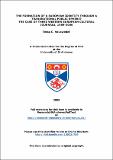The formation of a European identity through a transnational public sphere? The case of three Western European cultural journals, 1989-2006
Abstract
This thesis analyses processes of discursive European identity formation in three cultural journals: Esprit, from France, the British New Left Review and the German Merkur during the time periods 1989-92, and, a decade later, during 2003-06.
The theoretical framework which the thesis brings to bear on this analysis is that of the European Public Sphere. This model builds on Jürgen Habermas’s original model of a “public sphere”, and alleges that a sphere of common debate about issues of European concern can lead to a more defined and integrated sense of a European identity which is widely perceived as vague and inchoate. The relevancy of the public sphere model and its connection to the larger debate about European identity, especially since 1989, are discussed in the first part of the thesis.
The second part provides a comparative analysis of the main European debates in the journals during the respective time periods. It outlines the mechanisms by which identity is expressed and assesses when, and to what extent, shared notions of European identity emerge. The analysis finds that identity formation does not occur through a developmental, gradual convergence of views as the European public sphere model envisages. Rather, it is brought about in much more haphazard back-and-forth movements. Moreover, shared notions of European identity between all the journals only arise in moments of perceived crises. Such crises are identified as the most salient factor which galvanizes expressions of a common, shared sense of European identity across national boundaries and ideological cleavages.
The thesis concludes that the model of the EPS is too dependent on a partial view of how identity formation occurs and should thus adopt a more nuanced understanding about the complex factors that are at play in these processes. For the principled attempt to circumscribe identity formation as the outcome of communicative processes alone is likely to be thwarted by external events.
Type
Thesis, PhD Doctor of Philosophy
Collections
Items in the St Andrews Research Repository are protected by copyright, with all rights reserved, unless otherwise indicated.

